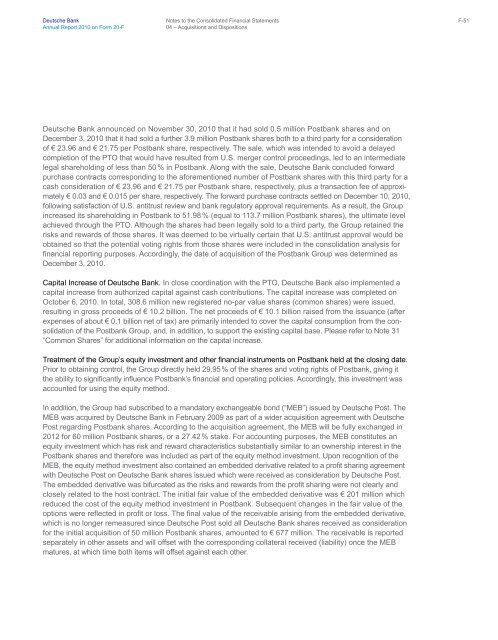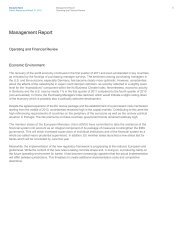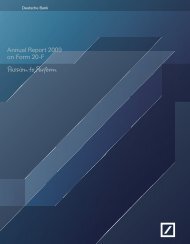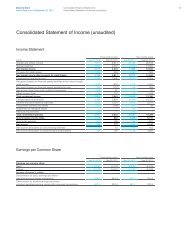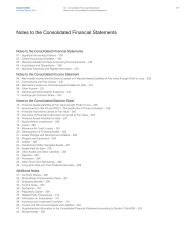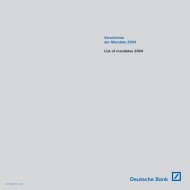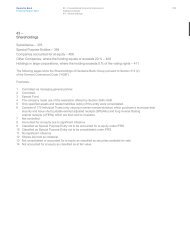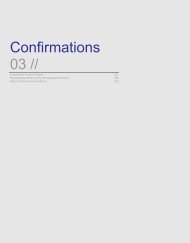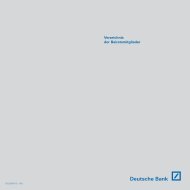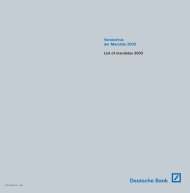SEC Form 20-F - Deutsche Bank Annual Report 2012
SEC Form 20-F - Deutsche Bank Annual Report 2012
SEC Form 20-F - Deutsche Bank Annual Report 2012
Create successful ePaper yourself
Turn your PDF publications into a flip-book with our unique Google optimized e-Paper software.
<strong>Deutsche</strong> <strong>Bank</strong> Notes to the Consolidated Financial Statements F-51<br />
<strong>Annual</strong> <strong>Report</strong> <strong>20</strong>10 on <strong>Form</strong> <strong>20</strong>-F 04 – Acquisitions and Dispositions<br />
<strong>Deutsche</strong> <strong>Bank</strong> announced on November 30, <strong>20</strong>10 that it had sold 0.5 million Postbank shares and on<br />
December 3, <strong>20</strong>10 that it had sold a further 3.9 million Postbank shares both to a third party for a consideration<br />
of € 23.96 and € 21.75 per Postbank share, respectively. The sale, which was intended to avoid a delayed<br />
completion of the PTO that would have resulted from U.S. merger control proceedings, led to an intermediate<br />
legal shareholding of less than 50 % in Postbank. Along with the sale, <strong>Deutsche</strong> <strong>Bank</strong> concluded forward<br />
purchase contracts corresponding to the aforementioned number of Postbank shares with this third party for a<br />
cash consideration of € 23.96 and € 21.75 per Postbank share, respectively, plus a transaction fee of approximately<br />
€ 0.03 and € 0.015 per share, respectively. The forward purchase contracts settled on December 10, <strong>20</strong>10,<br />
following satisfaction of U.S. antitrust review and bank regulatory approval requirements. As a result, the Group<br />
increased its shareholding in Postbank to 51.98 % (equal to 113.7 million Postbank shares), the ultimate level<br />
achieved through the PTO. Although the shares had been legally sold to a third party, the Group retained the<br />
risks and rewards of those shares. It was deemed to be virtually certain that U.S. antitrust approval would be<br />
obtained so that the potential voting rights from those shares were included in the consolidation analysis for<br />
financial reporting purposes. Accordingly, the date of acquisition of the Postbank Group was determined as<br />
December 3, <strong>20</strong>10.<br />
Capital Increase of <strong>Deutsche</strong> <strong>Bank</strong>. In close coordination with the PTO, <strong>Deutsche</strong> <strong>Bank</strong> also implemented a<br />
capital increase from authorized capital against cash contributions. The capital increase was completed on<br />
October 6, <strong>20</strong>10. In total, 308.6 million new registered no-par value shares (common shares) were issued,<br />
resulting in gross proceeds of € 10.2 billion. The net proceeds of € 10.1 billion raised from the issuance (after<br />
expenses of about € 0.1 billion net of tax) are primarily intended to cover the capital consumption from the consolidation<br />
of the Postbank Group, and, in addition, to support the existing capital base. Please refer to Note 31<br />
“Common Shares” for additional information on the capital increase.<br />
Treatment of the Group’s equity investment and other financial instruments on Postbank held at the closing date.<br />
Prior to obtaining control, the Group directly held 29.95 % of the shares and voting rights of Postbank, giving it<br />
the ability to significantly influence Postbank’s financial and operating policies. Accordingly, this investment was<br />
accounted for using the equity method.<br />
In addition, the Group had subscribed to a mandatory exchangeable bond (“MEB”) issued by <strong>Deutsche</strong> Post. The<br />
MEB was acquired by <strong>Deutsche</strong> <strong>Bank</strong> in February <strong>20</strong>09 as part of a wider acquisition agreement with <strong>Deutsche</strong><br />
Post regarding Postbank shares. According to the acquisition agreement, the MEB will be fully exchanged in<br />
<strong>20</strong>12 for 60 million Postbank shares, or a 27.42 % stake. For accounting purposes, the MEB constitutes an<br />
equity investment which has risk and reward characteristics substantially similar to an ownership interest in the<br />
Postbank shares and therefore was included as part of the equity method investment. Upon recognition of the<br />
MEB, the equity method investment also contained an embedded derivative related to a profit sharing agreement<br />
with <strong>Deutsche</strong> Post on <strong>Deutsche</strong> <strong>Bank</strong> shares issued which were received as consideration by <strong>Deutsche</strong> Post.<br />
The embedded derivative was bifurcated as the risks and rewards from the profit sharing were not clearly and<br />
closely related to the host contract. The initial fair value of the embedded derivative was € <strong>20</strong>1 million which<br />
reduced the cost of the equity method investment in Postbank. Subsequent changes in the fair value of the<br />
options were reflected in profit or loss. The final value of the receivable arising from the embedded derivative,<br />
which is no longer remeasured since <strong>Deutsche</strong> Post sold all <strong>Deutsche</strong> <strong>Bank</strong> shares received as consideration<br />
for the initial acquisition of 50 million Postbank shares, amounted to € 677 million. The receivable is reported<br />
separately in other assets and will offset with the corresponding collateral received (liability) once the MEB<br />
matures, at which time both items will offset against each other.


